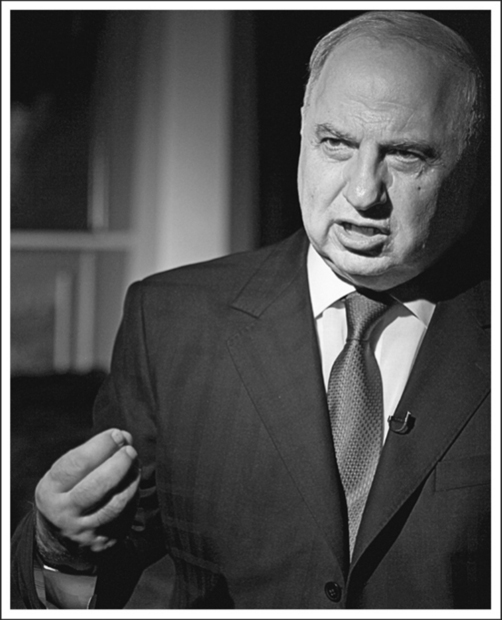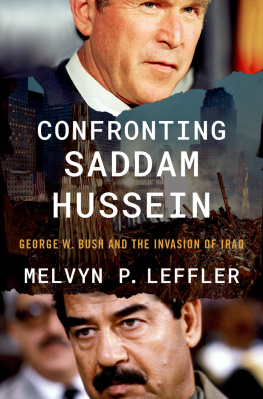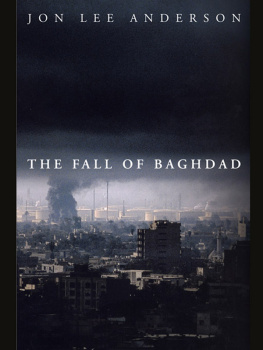
Copyright 2011 by Richard Bonin
All rights reserved. Published in the United States by Doubleday, a division of Random House, Inc., New York, and in Canada by Random House of Canada Limited, Toronto.
www.doubleday.com
DOUBLEDAY and the portrayal of an anchor with a dolphin are registered trademarks of Random House, Inc.
Jacket design by Emily Mahon
Jacket photograph by Goran Tomasevic Reuters/CORBIS
Frontispiece photograph is by courtesy of Associated Press/Karim Kadim
Library of Congress Cataloging-in-Publication Data
Bonin, Richard, 1957
Arrows of the night : Ahmad Chalabis long journey to triumph in Iraq / Richard Bonin.1st ed.
p. cm.
1. Chalabi, Ahmad, 1944 2. PoliticiansIraqBiography. 3. IraqisUnited StatesBiography. 4. Iraq War, 2003Political aspects. 5. United StatesPolitics and government20012009. I. Title.
DS 79.66. C 45 B 56 2011
956.70443092dc23
[B] 2011031208
eISBN: 978-0-385-53503-8
v3.1

AHMAD CHALABI, BAGHDAD, MAY 2010
To my Olivia and Abigail
CONTENTS
ONE
A hmad Chalabi was in Washington, D.C., on Inauguration Day, 2001. He had chosen his favorite double-breasted Ermenegildo Zegna suit and a bright orange tie to celebrate opening day of the George W. Bush presidency. With his mischievous smile and aristocratic bearing, the fifty-six-year-old Iraqi-born Chalabi made his way from one inaugural bash to the next, gliding among the crowds of Bush partygoers. A Muslim who neither smokes nor drinks, he took it all in with the eye of an exile and the soul of a schemer. What would the Bush era mean for him? he wondered. How could he make the most of it?
The day after Bushs swearing in, Chalabi took a car to Chevy Chase, Maryland, just outside the nations capital. He was invited to a meeting at the two-story home of Richard Perle, a leading figure in the neoconservative movement, which advocated using American military power to promote democracy abroad. Among those present, Chalabi said, were Paul Wolfowitz, Douglas J. Feith, Zalmay Khalilzad, and John P. Hannah. Within a few months, they all would hold influential positions in the new administrationwith Wolfowitz and Feith landing the number two and number three positions at the Pentagon and Perle becoming a top adviser to Secretary of Defense Donald Rumsfeld, Khalilzad a special assistant to Bush and ambassador at large for Iraqi exiles, and Hannah a national security adviser to Vice President Dick Cheney. But on this brisk and sunny afternoon, January 21, 2001, they were just a handful of like-minded civilians who saw the charting of U.S. foreign policy as both their dominion and their duty.
Everyone came casually dressed, some in blue jeans, sweaters, and polo shirtsexcept for Chalabi, who, as always, chose his outfits with care. In this case, a beige sports coat with blue pinstripes, a pale blue shirt, and a wide navy tie. Casual was not his way. They gathered in a small salon near the front of Perles house, seated around a glass coffee table atop a red-and-black Turkish rug and beneath a portrait of Arthur Rimbaud, the influential eighteenth-century French poet who was as famous for his scandalous behavior as he was for his groundbreaking and revolutionary writings.
Well, we have won. Perle beamed as he opened the meeting. And now we have to get our policy objective adopted by the administration.
That policy objective was both simple and audacious: to get Bush to back Chalabi in his long quest to overthrow Saddam Hussein.
We were sympathetic to what Ahmad was trying to accomplish, Perle later explained matter-of-factly. But more important, the group believed that Chalabi was the missing piece in their own strategy for engineering a post-Saddam Iraq. To them, Chalabi was a modern-day Charles de Gaulle, someone who shared our values and who could be trusted to carry U.S. national interests to the most vital of regions, the Middle East.
I believed at the time that we didnt know enough about Iraq to go in there and remake the place, Perle recounted. We had to work with somebody, and I thought that he was the right person.
So, over the next two hours, as they snacked on cold cuts and salad, they sketched out their agenda. Chalabi mostly listened. It was, in his estimation, a crucial meeting.
Of course, none of these people had jobs in the administration, Chalabi noted. But it was important that they would be mobilized early to move the agenda for the liberation of Iraq. The primary objective was to get ideas through to the people who would be in a position to do things. The ideas, he said, included that Saddam was dangerous to U.S. interests in the Middle East. He was bent on revenge [over losing the 19901991 Gulf War]. Another objective was to brush up and revive the arguments that would make it in the U.S. interest to help us overthrow Saddam.
By us Chalabi meant the Iraqi National Congress (INC), the fractious umbrella group of Iraqi exilescomposed of Shiites, Sunnis, and Kurdsthat he led. Chalabi was under no illusion about the enormity of the INCs challenge, especially given the roster of enemies he had amassed over the years inside the U.S. foreign policy establishment, which preferred to maintain the status quo in Iraq.
I didnt know how they were going to outmaneuver the State Department, Chalabi said of his neoconservative supporters. Or how they might neutralize the Central Intelligence Agency (CIA), where senior officials detested Chalabi, viewing him as a charlatan and an opportunist.
Then there was the question of Bush and where he stood on regime change. After a meeting with him in 2000, Perle had come to believe that Bush had the temperament to finish the job his father, George H. W. Bush, had begun. But Chalabi and his supporters gathered at Perles house that afternoon realized they would have to persuade the new president to make a U-turn on his campaign pronouncements denouncing nation building.
Perle, who had spent a quarter century in governmentfirst on Capitol Hill as a Senate staffer and later as a senior Pentagon official in the Reagan administrationknew from experience that the fate of their agenda would most likely boil down to what he called the battle of the memos. He advised the group in his sitting room that while he expected many of them to land senior positions in the new administration through which they could promote their cause, they would still face formidable opposition from the career professionals in the State Department, the Department of Defense, and the intelligence community. He called members of that permanent bureaucracy mattress mice because of their skill in quietly and anonymously gnawing away at policy initiatives they opposed. As one of the participants at the meeting described it, Just when you think your bed is all made up and your policy is securely in place, along come these mattress mice with their nay-saying memos and, before you know it, youre lying on a bed of shreds.
To counter the mattress mice, Perle advised that they preassemble their own stack of memos to answer the likely arguments opposing regime change: that the United Nations trade sanctions against Iraq, though imperfect, were working well enough; that Saddam was safely contained and posed a minimal threat to the United States; that whatever the upside of removing the dictator might be, it was not worth the inevitable empowerment of neighboring Iran; that because Iraq is so ethnically divided, toppling Saddam could lead to a dangerous and uncontrollable explosion in ethnic and religious violence among its people; that without a strongman the country could break up into separate Shiite, Sunni, and Kurdish enclaves, igniting an ethnic war so chaotic and violent that it would destabilize the region. There was much work to be done.










